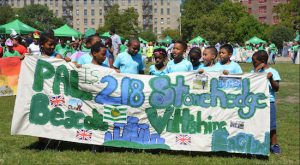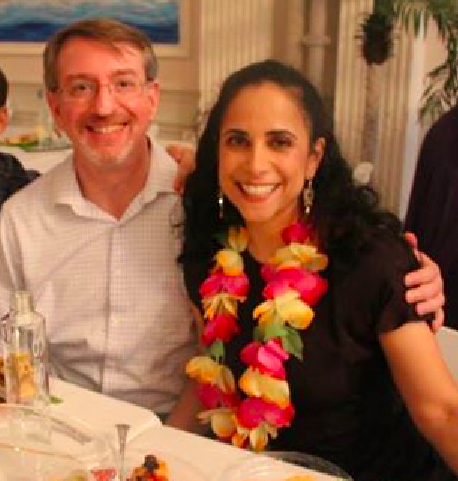
Mikvah ‘Bar Mitzvah’ in Brooklyn Heights

Tahitian breezes blew through Brooklyn Heights last Wednesday night: Fresh fish and Polynesian chicken were being served under an authentic grass Tiki hut; palm trees dotted the room, and visions of pristine, blue-and-tan beaches graced the walls.
An indoor mirage? No, a Modern Orthodox synagogue, Congregation B’nai Avraham on Remsen Street, was celebrating the 13th anniversary of its mikvah, the ritual Jewish bath whose history goes back thousands of years.
“People are here because mikvah [the law of immersion] is totally current, and more alive than ever,” said Rabbi Aaron Raskin, the synagogue’s leader, as he surveyed the flower-lei-wearing crowd of 20-something singles, married couples and diverse guests.
The featured speaker, Sarah Esther Crispe, discussed the kind of loving intimacy that a marriage needs to survive and how the observance of mikvah could sustain that.
“Love is a head-to-head, heart-to-heart, soul-to-soul, body-to-body connection,” said Crispe, editor of TheJewishWoman.org. Observance of mikvah “gives us the opportunity to effect the emotional quality of a marriage, to work on our own communication and how we demonstrate our love, how we comfort and support our spouse without being physical during the days when we refrain from physical intimacy.”
In observance of the laws of family purity, a observant Jewish woman is not allowed physical contact with her husband during the time of her menstrual period and for seven days following. Once she has experienced seven “clean” days, she immerses in the mikvah, after a spa-like cleansing of her own body — down to the paring of her nails and the thorough brushing of her hair, lest a single strand float above the water’s surface, rendering her immersion not kosher.
“Mikvah night,” the colloquial term for the day a mikvah-observant woman is free to have sexual relations with her husband once again, is a kind of monthly celebration, albeit a lesser talked about one in which she and her husband reunite.
“A woman’s menstruation and how she prepares herself for mikvah affects the couple, man and woman, as a whole. She is transformed every month. The mikvah is like a womb, and the root of the word for womb in Hebrew, rechem, is the root of the word rachmaniut (empathy). We (Jewish women) have to mother ourselves in order to mother.”
Sexual relations not involving procreation were discussed. A mystical diagram of the Hebrew word lev (heart), taken from the writings of 13th century Kabbalist Abraham Abulafia, was displayed, and inspiring words exchanged.
Two congregants, the evening’s honorees, spoke of their mikvah practice.
Natalie Botton Buchwald, a newcomer to the neighborhood, described her emotionally-charged visit to the B’nai Avraham mikvah after her first month of marriage.
“My hair was still wet, and I was walking down Court Street and I couldn’t believe that I had just been a part of what Jewish women have been doing for thousands of years,” she related.
“Did the people around me know? I almost wanted to say to them, ‘do you know what I just did?’ The feeling of connection was so amazing.”
Naomi Weinberger, the night’s other honoree, was introduced by her mother-in-law, Charlotte Weinberger, who raised her family in Oceanside and followed her son’s family to Brooklyn Heights.
“We have been blessed with terrific mikvah ladies who are connected to the mitzvah to the nth degree,” Naomi said.
“What’s more, its beautiful design is modeled on a Turkish bath mixed with a day spa — it’s a little jewel in our shul.”
After all the speakers left the podium, a conversation ensued at one table between a married Orthodox woman and a Conservative Jewish woman.
“So you’ve never been to mikvah?” asked the first.
“No, I’ve always been too embarrassed; I didn’t how to ask,” replied the other.
Leave a Comment
Leave a Comment



